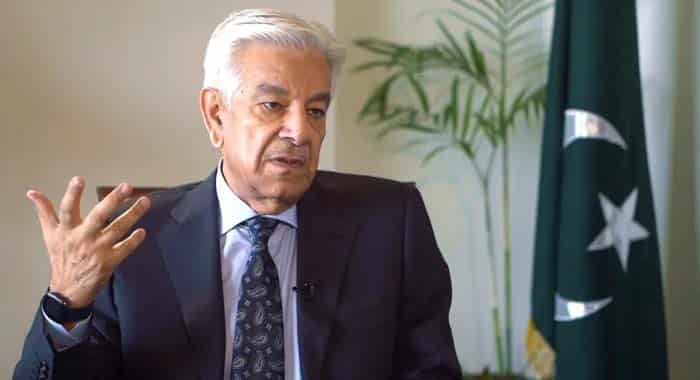Defence Minister Khawaja Asif said today that Pakistan remains willing to engage in meaningful, results-oriented talks with Afghanistan, but made it unequivocally clear that there will be no negotiations with the proscribed Tehreek-e-Taliban Pakistan (TTP) and that any use of Afghan territory to mount attacks against Pakistan will be met with decisive response unless Kabul provides credible guarantees and assumes responsibility.
Speaking on Geo News’ “Aaj Shahzeb Khanzada Ke Saath,” Asif reiterated Pakistan’s openness to dialogue while setting firm preconditions. Recalling a delegation visit to Kabul three years ago, he said Pakistan held four-to-five hours of substantive talks with senior Afghan officials, during which Islamabad urged that sanctuaries for proscribed elements not be tolerated. “We warned them that if these sanctuaries continued, and we reached a point where we could not endure such support, we would be compelled to take action,” he said.
Asif disclosed that one past proposal under consideration involved relocating members of the proscribed TTP to a third country; an estimated cost of Rs10 billion was calculated. He said that option was abandoned because there was no assurance those individuals would not take the funds and simply return to their safe havens. “There was no guarantee they would not come back,” he said. “Without guarantees, such measures are futile.”
On the core issue of guarantees, the defence minister was explicit: Pakistan will engage in bona fide negotiations only if Kabul offers binding assurances and accepts responsibility for preventing attacks from its territory. “Kabul did not give those guarantees before and it is not giving them now,” he said. “Even if assurances are offered, they have not been honoured in the past.” He made clear, however, that Pakistan will not open any channel of negotiation with the proscribed TTP.
Asif said Islamabad had urged Afghan authorities to neutralise and control proscribed elements on their soil so that attacks do not originate from there. He added that Afghan officials had indicated, in veiled terms, that certain TTP fighters had been aligned with Afghan resistance to the United States a factor, they suggested, that constrained Kabul from taking robust action against them. That explanation, he said, had formed part of earlier discussions about resettlement.
Turning to recent developments, Asif warned that statements by some Afghan officials from foreign capitals and any attempts to instrumentalise Afghanistan against Pakistan will be met with an appropriate response. “If Afghan soil is used against us, action will follow. We will pursue those elements even on Afghan territory; under every law we have the right to act against the proscribed TTP,” he said. He added that Pakistan would welcome genuine Afghan responsibility and cooperation.
Accusing external actors of complicity, the defence minister claimed that India was facilitating hostile activity from Afghan soil and was attempting to avenge setbacks it suffered in operations such as ‘Bunyan al-Marsus’. “At India’s behest these activities are being carried out from Afghan territory,” he alleged.
Responding to questions about the security situation in Khyber Pakhtunkhwa, Asif said insurgent incidents continue in the province and warned that certain local rhetoric and political choices embolden those who shelter or support militant causes. He criticised moves he said had weakened state authority, including actions by former political leaders that, he claimed, led to the expansion of sanctuaries and the settlement of thousands in protected areas. On Ali Amin Gandapur, Asif said there was insufficient cooperation with law-enforcement during his tenure and accused him of facilitating the growth of such sanctuaries.
Asif concluded by underlining Pakistan’s stance: Islamabad remains open to meaningful, verifiable dialogue with Afghanistan, but this willingness is conditional on Kabul’s ability and willingness to deliver guarantees and to act decisively against proscribed groups. In the absence of credible assurances and concrete action, Pakistan reserves the right to defend its sovereignty and security through all lawful means.





